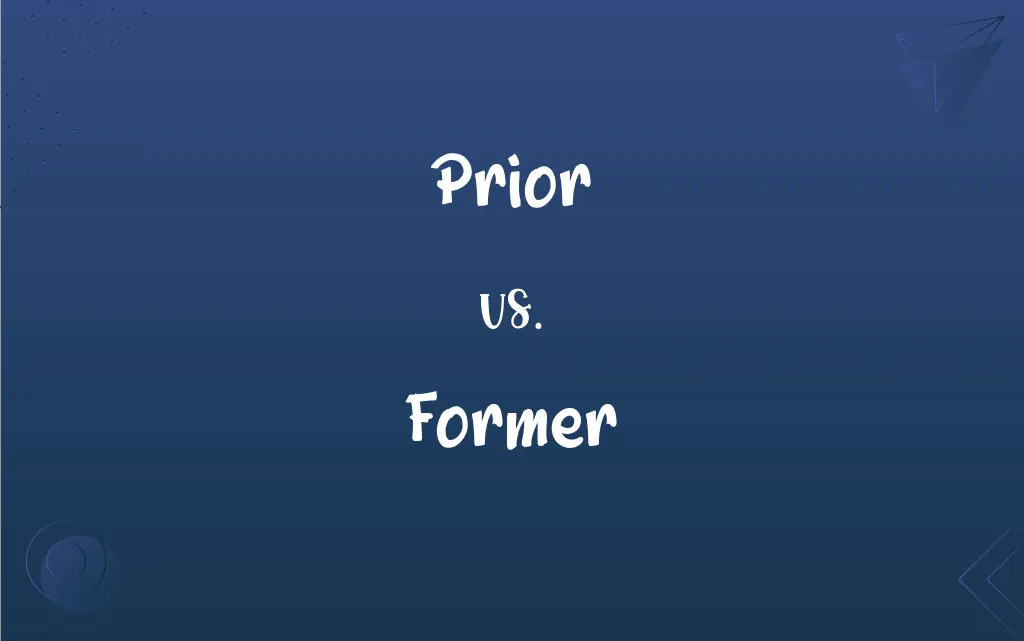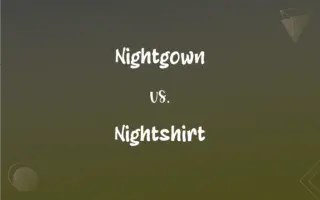Prior vs. Former: What's the Difference?
By Harlon Moss & Aimie Carlson || Updated on May 23, 2024
Prior refers to something that came before in time or order, while former describes something that once held a certain status or position but no longer does.

Key Differences
Prior is used to indicate something that occurred or existed before a specific event or time. It emphasizes the sequence and timing of events. Former, on the other hand, refers to a status or position that someone or something held in the past but no longer holds. It highlights a change in status.
Both terms deal with aspects of time, but prior is more about the order of events, while former focuses on a past status or role. Prior can be used more flexibly to describe any preceding event or condition. Former is specifically used to describe something or someone that had a particular role, position, or identity in the past.
In usage, prior is often found in contexts where sequence or precedence is important. It is commonly used in formal writing and speech to specify the time relationship between events. Conversely, former is frequently used to describe previous roles, titles, or states, often in formal or semi-formal contexts.
While prior is more neutral, simply marking a point in time before another, former often carries a sense of change or transition, indicating that something was once a certain way but has since changed.
Comparison Chart
Definition
Happening before a certain event
Referring to a past status or role
ADVERTISEMENT
Usage Context
Order or sequence of events
Describing previous positions or roles
Connotation
Neutral
Indicates change or transition
Example Usage
Prior to the exam, he studied hard.
The former CEO now advises the company
Flexibility
Describes any preceding event/condition
Specific to past roles/statuses
Prior and Former Definitions
Prior
Existing or coming before in order.
She had prior experience in marketing.
ADVERTISEMENT
Former
Belonging to the past.
They visited her former home.
Prior
Preceding in importance or rank.
He placed his family's needs prior to his own.
Former
Previous or earlier in status.
She is a former member of the club.
Prior
Former or earlier in context.
They met at a prior event.
Former
Once holding a particular identity or state.
The building was a former library.
Prior
Preceding in time or order
“[They] insist that foreign vessels seeking access obtain prior approval” (Seymour M. Hersh).
Former
One that forms; a maker or creator
A former of ideas.
Prior
Preceding in importance or value
A prior consideration.
Former
A member of a school form
A fifth former.
Prior
Usage Problem Before.
Former
The first of two persons or things mentioned
"The army was pulling itself together, the government was coming apart. The success of the former was continually imperiled by the failure of the latter" (Garry Wills).
Prior
A previous conviction or arrest
The suspect has two priors.
Former
Relating to or taking place in the past
In former times.
Prior
A monastic officer in charge of a priory or ranking next below the abbot of an abbey.
Former
Having been so in the past
A former ambassador.
His former boss.
Prior
One of the ruling magistrates of the medieval Italian republic of Florence.
Former
Being the first of two mentioned.
Prior
Advance; previous; coming before.
I had no prior knowledge you were coming.
Former
Previous.
A former president;
The former East Germany
Prior
Former, previous.
His prior residence was smaller than his current one.
Former
First of aforementioned two items. Used with the, often without a noun.
The former is a good idea but the latter is not.
We have two cars, a red one and a blue one. We won the former on a game show.
Prior
(colloquial) Previously.
The doctor had known three months prior.
Former
Someone who forms something; a maker; a creator or founder.
Dave was the former of the company.
Prior
A previous arrest or criminal conviction on someone's record.
Former
An object used to form something, such as a template, gauge, or cutting die.
The brick arch was built using a wooden former.
Prior
A prior probability distribution, one based on information or belief before additional data is collected.
Former
Someone in, or of, a certain form (class).
Prior
A belief supported by previous evidence or experience that one can use to make inferences about the future.
Former
One who forms; a maker; a creator.
Prior
A high-ranking member of a monastery, usually lower in rank than an abbot.
Former
A shape around which an article is to be shaped, molded, woven wrapped, pasted, or otherwise constructed.
Prior
(historical) A chief magistrate in Italy.
Former
Preceding in order of time; antecedent; previous; prior; earlier; hence, ancient; long past.
For inquire, I pray thee, of the former age.
The latter and former rain.
Prior
Preceding in the order of time; former; antecedent; anterior; previous; as, a prior discovery; prior obligation; - used elliptically in cases like the following: he lived alone [in the time] prior to his marriage.
Former
Near the beginning; preceeding; as, the former part of a discourse or argument.
Prior
First, precedent, or superior in the order of cognition, reason or generality, origin, development, rank, etc.
Former
Earlier, as between two things mentioned together; first mentioned.
A bad author deserves better usage than a bad critic; a man may be the former merely through the misfortune of an ill judgment; but he can not be latter without both that and an ill temper.
Prior
The superior of a priory, and next below an abbot in dignity.
Former
The first of two or the first mentioned of two;
Tom and Dick were both heroes but only the former is remembered today
Prior
A chief magistrate, as in the republic of Florence in the middle ages.
Former
Referring to the first of two things or persons mentioned (or the earlier one or ones of several);
The novel was made into a film in 1943 and again in 1967; I prefer the former version to the latter one
Prior
A prior conviction; - said of an accused criminal.
Former
Belonging to some prior time;
Erstwhile friend
Our former glory
The once capital of the state
Her quondam lover
Prior
The head of a religious order; in an abbey the prior is next below the abbot
Former
(used especially of persons) of the immediate past;
The former president
Our late President is still very active
The previous occupant of the White House
Prior
Earlier in time
Former
Of the distant past;
The early inhabitants of Europe
Former generations
In other times
Prior
Happening before in time.
Prior to the game, the players warmed up.
Former
Having previously been a certain role or title.
He is a former senator.
Prior
Previous or earlier.
The prior meeting was more productive.
Former
Previously in a specific role or position.
The former manager now works elsewhere.
FAQs
What does former mean?
Former refers to a past status or role that is no longer held.
Is former always related to positions or titles?
Yes, it usually refers to past roles or statuses.
How is former commonly used?
To indicate previous roles or statuses, e.g., "The former president."
What does prior mean?
Prior means happening or existing before a certain event or time.
How is prior commonly used?
To indicate something that happened before another event, e.g., "Prior to the event."
Can prior be used in everyday speech?
Yes, it is used in both formal and informal contexts.
Is prior used to describe roles?
Not typically; it describes events or conditions preceding others.
Can prior and former be used interchangeably?
No, prior indicates sequence, while former refers to past roles.
Does prior have a formal tone?
Yes, it is often used in formal writing and speech.
Does former indicate a change?
Yes, it implies that the status or role has changed.
Can prior describe immediate past events?
Yes, it can describe recent or distant past events.
Is former used in historical contexts?
Yes, to describe past roles or statuses in history.
Is former more specific than prior?
Yes, former specifically refers to past roles or statuses.
Is prior related to precedence?
Yes, it often refers to the order of events.
Does former carry a sense of nostalgia?
It can, as it refers to a past state or role.
Can both terms be used in the same sentence?
Yes, e.g., "Prior to her former role as manager, she was an assistant."
Can former be used for non-positions?
Sometimes, for places or things that have changed, e.g., "former residence."
Can prior be used in legal contexts?
Yes, it is commonly used in legal and official documents.
Does prior indicate a specific time frame?
It indicates an event preceding another but not a specific time frame.
Does former imply permanence?
Yes, it implies that the status or role has permanently changed.
About Author
Written by
Harlon MossHarlon is a seasoned quality moderator and accomplished content writer for Difference Wiki. An alumnus of the prestigious University of California, he earned his degree in Computer Science. Leveraging his academic background, Harlon brings a meticulous and informed perspective to his work, ensuring content accuracy and excellence.
Co-written by
Aimie CarlsonAimie Carlson, holding a master's degree in English literature, is a fervent English language enthusiast. She lends her writing talents to Difference Wiki, a prominent website that specializes in comparisons, offering readers insightful analyses that both captivate and inform.
































































